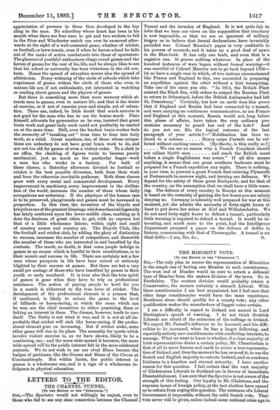LETTERS TO THE EDITOR.
THE CHANNEL TUNNEL. [To THE EDITOR OP THE "SPECTATOR.1 SuL,—The Spectator would not willingly be unjust, even to -those who fail to see any close connection between the Channel
Tunnel and the invasion of England. It is not quite fair to infer that we base our views on the supposition that treachery is now impossible, or that we are so ignorant of military history as to believe that formal declarations have invariably preceded war. Colonel Maurice's paper is very creditable to his powers of research, and it takes up a good deal of space in the Blue-book. It has only one fault, and even that is a negative one. It proves nothing whatever. In place of the hundred instances of wars begun without formal warning—it was merciful of Colonel Maurice not to go back beyond 1700— let us have a single case in which, of two nations circumstanced like France and England to-day, one succeeded in preparing an expedition against the other without a hint transpiring. Take one of the cases you cite. " In 1854, the British Fleet entered the Black Sea, with orders to compel the Russian Fleet to return to Sebastopol, before the British Ambassador had left St. Petersburg." Certainly, but how on earth does this prove that if England and Russia had been connected by a tunnel, and were carrying on continuous communication, as are France and England at this moment, Russia would not, long before this phase of affairs, have taken the very ordinary pre- cautions necessary to guard her end of the hole P And do you not see, Sir, the logical outcome of the last paragraph of your article ?—" Mobilisation has been re-
duced to a science Heavy corps d'arm4e can be col- lected without exciting remark. [By-the-by, is this really so P]
We can see no reason why a French President should not collect 30,000 men and reach the British coast
before a single Englishman was aware." If all this means anything, it means that our great southern harbours must be prepared for a French expedition any night. There is nothing, in your view, to prevent a great French fleet entering Plymouth or Portsmouth to-morrow night, and turning our defences. We depend for the safety of these great Dockyards, and for that of the country, on the assumption that we shall have a little warn- ing. The defence of every country in Europe at this moment is based on the certainty of gaining the few hours you are calmly denying us. Germany is tolerably well prepared for war at this moment, yet she admits the necessity of forty-eight hours at least to put down her mines at Kiel and Wilhelmshafen. We do not need forty-eight hours to defend a tunnel; particularly little warning is required to defend a tunnel. It would be in- teresting, and much more to the point, had the Intelligence Department prepared a paper on the defence of defiles iu history, commencing with that of Thermopylx. A tunnel is an










































 Previous page
Previous page